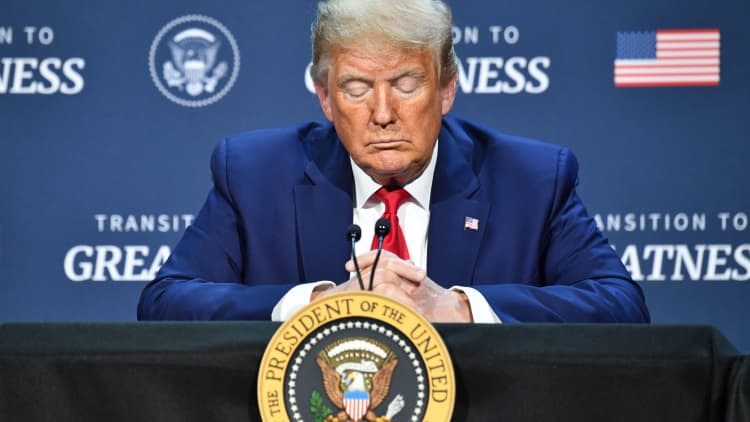
President Donald Trump did not commit to significant police reform Thursday as the United States faces its biggest reckoning in decades over brutality and racism in law enforcement.
At a roundtable event in Dallas, Trump said he is finalizing an executive order to "encourage police departments nationwide to meet the most current professional standards of force" and de-escalation. He said "that means force, but force with compassion."
He did not detail how his administration would require police to meet those standards, or whether he supported any major reforms as lawmakers at the local, state and federal levels consider how to overhaul policing. Trump's plan for a vague executive order comes as his Republican allies in Congress consider more significant law enforcement reforms.
As the country grapples with how to address ingrained racial inequities, Trump added that the White House would "aggressively pursue" economic development in communities of color by increasing access to capital for small businesses. He also said his administration would work to address racial health-care disparities and call on Congress to enact school choice legislation.
Large-scale protests against police brutality and systemic racism have engulfed the nation since the Memorial Day death of George Floyd, an unarmed black man, in the custody of Minneapolis police. The demonstrations have led cities around the country to consider how to reform their departments, and some have committed to cutting police funding or even replacing their departments entirely.
Trump criticized calls by activists and certain Democratic officials to pull money from police departments, arguing the U.S. needs to "invest more energy and resources" in training and community engagement. The president appeared to downplay systemic issues with policing: He contended departments have "bad apples" but "not too many of them."
Congressional Democrats have already introduced a sweeping police reform plan, but Trump opposes major provisions in it including rolling back "qualified immunity" protections for officers that make it harder for victims of abuses to get damages. The bill would create a federal registry of police violence, make it easier to prosecute officers who commit abuses and ban chokeholds and "no-knock" search warrants, among other provisions.
Sen. Tim Scott, R-S.C., has led discussions on a Senate Republican proposal. He met with Trump advisors earlier this week.
Before Trump spoke Thursday, House Minority Leader Kevin McCarthy indicated the GOP could back pieces of the Democratic proposal, Politico reported. The California Republican said "there's a lot of concepts that we agree upon" in changing police practices.
Prior to detailing proposals in Dallas, Trump pointed to the ways he said he has "been fighting for the forgotten men and women of America." He noted that he signed criminal justice reform legislation and secured funding for historically black colleges and universities.
The president also noted that the U.S. had "the lowest black unemployment in the history" before the coronavirus pandemic hit. He said "we'll get it back again soon."
Unemployment trends show just one of the sustained examples of racial inequity in the U.S. In May, the unemployment rate for black Americans ticked slightly higher to 16.8%, while the rate for white people fell to 12.4%.
The record-low 5.5% unemployment rate among black people in September 2019 was higher than the 3.2% rate for whites.


